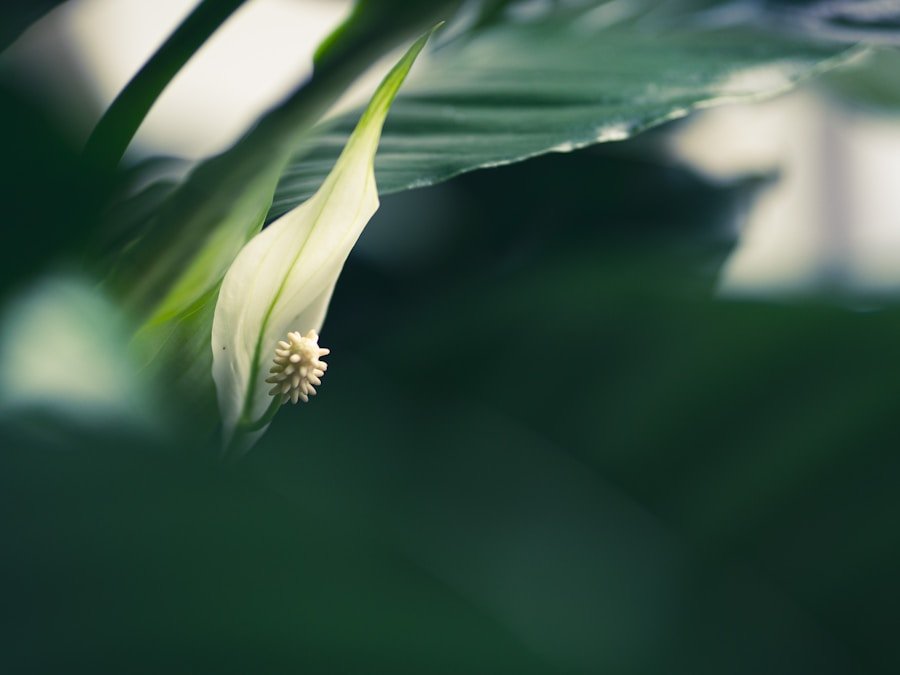Indoor plants have been recognized for their ability to enhance the visual appeal of a space, but their advantages extend beyond mere aesthetics. Recent research has accumulated, indicating that indoor plants can positively influence sleep quality. As sleep disorders and poor sleep quality become increasingly prevalent, many individuals are seeking natural solutions, such as indoor plants, to improve their sleep.
This article delves into the relationship between indoor plants and sleep, examining the effects of air quality, stress reduction, aromatherapy, and the most effective indoor plants for enhancing sleep. Furthermore, it provides guidance on incorporating indoor plants into the bedroom to optimize their sleep-promoting benefits.
Key Takeaways
- Indoor plants can improve sleep quality by enhancing air quality, reducing stress, and providing aromatherapy benefits.
- The presence of indoor plants in the bedroom can help create a calming and relaxing environment, which is conducive to better sleep.
- Certain indoor plants can help purify the air by removing toxins and releasing oxygen, which can lead to improved sleep quality.
- Indoor plants can help reduce stress and anxiety, leading to a more restful and rejuvenating sleep experience.
- Aromatherapy from indoor plants can have a positive impact on sleep quality, with certain scents promoting relaxation and better sleep.
The Connection Between Indoor Plants and Sleep
Improving the Environment for Better Sleep
Research has shown that indoor plants can improve the overall environment of a space, leading to better sleep quality. By reducing stress, lowering blood pressure, and improving mood, indoor plants create an atmosphere conducive to sleep. Additionally, they increase humidity levels, alleviating dryness in the nasal passages and throat, which can reduce symptoms of snoring and sleep apnea.
Creating a Calming Atmosphere
The presence of indoor plants creates a calming and soothing atmosphere, promoting relaxation and preparing the body for sleep. By creating a peaceful and serene environment, indoor plants help individuals fall asleep faster and stay asleep longer, leading to improved overall sleep quality.
Physiological Benefits of Indoor Plants
On a physiological level, indoor plants reduce carbon dioxide levels and increase oxygen levels, directly impacting sleep quality. High carbon dioxide levels can lead to drowsiness and fatigue, while increased oxygen levels promote alertness and mental clarity during the day, leading to better sleep at night. Furthermore, certain indoor plants remove toxins from the air, such as formaldehyde and benzene, which can negatively impact respiratory health and overall well-being. By improving air quality, indoor plants help individuals breathe easier and experience fewer disruptions during sleep, leading to a more restful night’s sleep.
Air Quality and Indoor Plants’ Impact on Sleep
The impact of indoor plants on air quality is one of the key factors in their ability to improve sleep quality. Many indoor plants have been found to remove harmful toxins from the air, such as formaldehyde, benzene, and trichloroethylene, which are commonly found in household products and can have a negative impact on respiratory health. By removing these toxins from the air, indoor plants can help individuals breathe easier and experience fewer disruptions during sleep.
In addition, indoor plants have been found to increase humidity levels in the air, which can help alleviate dryness in the nasal passages and throat, reducing symptoms of snoring and sleep apnea. By creating a more comfortable and healthy environment, indoor plants can help individuals achieve a more restful night’s sleep. Furthermore, the presence of indoor plants can help reduce levels of carbon dioxide in the air and increase oxygen levels, which can have a direct impact on sleep quality.
High levels of carbon dioxide can lead to feelings of drowsiness and fatigue, while increased oxygen levels can help promote alertness and mental clarity during the day, leading to better sleep at night. By improving air quality, indoor plants can help individuals feel more refreshed and rejuvenated upon waking, leading to improved overall sleep quality.
Stress Reduction and Indoor Plants’ Influence on Sleep
| Benefit | Explanation |
|---|---|
| Improved Air Quality | Plants can remove toxins and increase oxygen levels, promoting better breathing during sleep. |
| Reduced Stress | Studies show that being around plants can reduce stress and anxiety, leading to better sleep. |
| Humidity Regulation | Plants can help regulate indoor humidity, creating a more comfortable sleep environment. |
| Calming Effect | The presence of plants can create a calming and soothing atmosphere, promoting relaxation before sleep. |
Indoor plants have been found to have a significant impact on stress reduction, which can in turn improve sleep quality. The presence of indoor plants has been shown to reduce levels of stress and anxiety, lower blood pressure, and improve mood, all of which are important factors in promoting better sleep. By creating a calming and soothing atmosphere, indoor plants can help individuals relax and unwind before bedtime, leading to improved overall sleep quality.
In addition to their visual appeal, indoor plants have been found to have a positive impact on mental well-being. Research has shown that simply being in the presence of indoor plants can help reduce feelings of stress and anxiety, leading to a more relaxed state of mind. By creating a peaceful and serene environment, indoor plants can help individuals prepare for sleep and experience fewer disruptions during the night, leading to a more restful night’s sleep.
The Role of Aromatherapy in Indoor Plants and Sleep Quality
Aromatherapy is another important factor in the connection between indoor plants and sleep quality. Many indoor plants have been found to release natural scents that can have a calming and soothing effect on the mind and body. These natural scents can help promote relaxation and prepare the body for sleep, leading to improved overall sleep quality.
In addition to their visual appeal, many indoor plants have been found to release natural scents that can have a positive impact on mood and mental well-being. Research has shown that certain scents can help reduce feelings of stress and anxiety, promote relaxation, and improve overall mood, all of which are important factors in promoting better sleep. By incorporating indoor plants with natural scents into your bedroom, you can create a calming and soothing atmosphere that can help you relax and unwind before bedtime, leading to improved overall sleep quality.
Best Indoor Plants for Improving Sleep
Top Plants for a Restful Night’s Sleep
When it comes to selecting indoor plants to improve sleep quality, there are several options to consider. Some of the best indoor plants for improving sleep include lavender, jasmine, aloe vera, snake plant, and peace lily. These plants have been found to release natural scents that can promote relaxation and improve overall mood, leading to better sleep quality.
The Power of Natural Scents
These plants have been found to release natural scents that can promote relaxation and improve overall mood, leading to better sleep quality.
Improving Air Quality for a Peaceful Environment
In addition to their natural scents, these indoor plants have been found to improve air quality by removing harmful toxins from the air and increasing oxygen levels. By incorporating these indoor plants into your bedroom, you can create a more peaceful and serene environment that can help you relax and prepare for sleep, leading to improved overall sleep quality.
Tips for Incorporating Indoor Plants into Your Bedroom for Better Sleep
Incorporating indoor plants into your bedroom is a great way to improve sleep quality. When choosing indoor plants for your bedroom, it’s important to consider factors such as light levels, humidity levels, and maintenance requirements. Some tips for incorporating indoor plants into your bedroom for better sleep include choosing low-maintenance plants that thrive in low light conditions, such as snake plant or peace lily.
Additionally, it’s important to consider the size of your bedroom and choose plants that will fit comfortably in the space without overcrowding. Another tip for incorporating indoor plants into your bedroom for better sleep is to consider the natural scents released by certain plants. Lavender and jasmine are known for their calming and soothing scents that can promote relaxation and improve overall mood, leading to better sleep quality.
By choosing indoor plants with natural scents that you find appealing, you can create a more peaceful and serene environment that can help you relax and prepare for sleep. In conclusion, indoor plants have been found to have a positive impact on sleep quality through their ability to improve air quality, reduce stress, promote relaxation through aromatherapy, and create a calming environment. By incorporating indoor plants into your bedroom and choosing the right plants for your space, you can create a more peaceful and serene environment that can help you relax and prepare for sleep, leading to improved overall sleep quality.
Whether you choose lavender for its calming scent or snake plant for its air-purifying properties, adding indoor plants to your bedroom is a natural way to enhance your sleep environment and promote better rest.
FAQs
What are the benefits of having indoor plants for sleep quality?
Indoor plants can improve sleep quality by purifying the air, reducing stress and anxiety, and promoting relaxation and a sense of well-being.
Which indoor plants are best for improving sleep quality?
Plants such as lavender, jasmine, aloe vera, snake plant, and peace lily are known for their ability to improve sleep quality due to their calming and air-purifying properties.
How do indoor plants purify the air and improve sleep quality?
Indoor plants can remove toxins and pollutants from the air through a process called phytoremediation, which can lead to better air quality and improved sleep.
Do indoor plants have any negative effects on sleep quality?
While indoor plants generally have positive effects on sleep quality, some people may be allergic to certain plants, which could potentially disrupt their sleep. It’s important to choose plants carefully and consider any allergies or sensitivities.
How many indoor plants are needed to improve sleep quality?
The number of indoor plants needed to improve sleep quality can vary depending on factors such as room size, plant size, and individual preferences. In general, having a few well-placed plants in the bedroom can make a positive difference in sleep quality.




